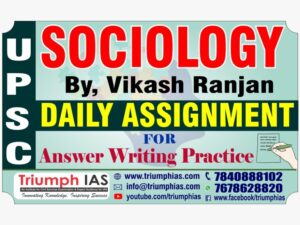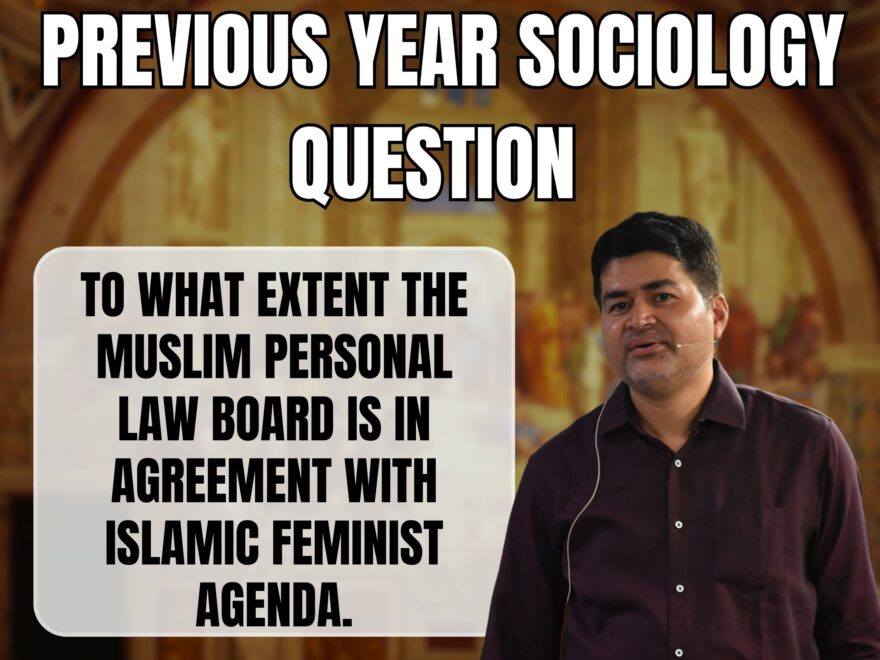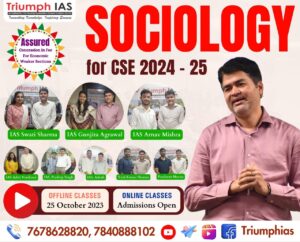To what extent the Muslim Personal Law Board is in agreement with Islamic Feminist agenda.
Section: B.
Sociology Paper 2015.
Relevant for Sociology Optional for Civil Services Examination.
Paper 2: Unit-12 Social Structure; Religion and Society
Question: what extent the Muslim Personal Law Board is in agreement with Islamic Feminist agenda.
– 10 Marks
Introduction: Brief About AIMPLB.Main Body: view points of Islamic feminism, Differing viewpoint of AIMPB and Islamic Feminist Agenda.Conclusion: on lines of realignment to promote gender equality and equal opportunities. |
Introduction:
- The All India Muslim Personal Law Board (AIMPLB) is an Indian organization founded in 1973. It aims to protect and uphold Islamic personal laws for Muslims in India, addressing matters like marriage, divorce, and inheritance, and representing Muslim interests in legal and social matters.
- Islamic feminism, on the other hand, seeks to address gender inequalities within Muslim communities by reinterpreting Islamic principles in a way that promotes gender equality and women’s rights.
Main Body:
Key viewpoints of Islamic feminism include:
- Equality in Religious Interpretation: Islamic feminists argue for greater inclusivity in religious interpretation and scholarship, advocating for women’s participation in Islamic jurisprudence and theology. Fatema Mernissi explore the intersections of Islam, feminism, and patriarchy, emphasizing the need for a reinterpretation of Islamic texts to empower women.
- Reinterpretation of Quranic Texts: They reinterpret Quranic verses to emphasize the principles of justice, equality, and human dignity, asserting that these principles are compatible with gender equality.
- Reform of Family Laws: Islamic feminists often focus on reforming family laws, advocating for women’s rights in marriage, divorce, and inheritance. They seek to challenge discriminatory practices and emphasize consent and agency.
- Promotion of Education: Islamic feminists stress the importance of education for women, citing examples of educated Muslim women during the time of Prophet Muhammad and early Islamic history.
- Addressing Cultural Practices: They work to distinguish between cultural practices and true Islamic teachings, challenging harmful cultural traditions that may oppress women. Nawal El Saadawi: challenge oppressive practices and advocate for women’s liberation
Differing viewpoint of AIMPB and Islamic Feminist agenda
- Differing Interpretations: There is a diversity of interpretations within the AIMPLB, and different scholars and members may have varying views on gender issues. Some may be more open to feminist interpretations, while others may adhere to more traditional interpretations of Islamic law.
- Reform Initiatives: the AIMPLB has taken some steps to address gender issues within the framework of Islamic personal laws, such as introducing reforms related to divorce procedures. However, these changes may not fully align with the goals of Islamic feminists.
- Opposition to Uniform Civil Code: The AIMPLB has been vocal in opposing the implementation of a Uniform Civil Code in India, arguing that it would infringe upon the religious rights of Muslims. This stance has been criticized by some Islamic feminists who see it as an obstacle to achieving gender justice.
- Women’s Representation: The AIMPLB has faced criticism for not having adequate female representation and decision-making roles within the organization. Islamic feminists advocate for greater inclusion of women in religious and legal discussions.
- Controversial Statements: Some statements made by AIMPLB members in the past have drawn criticism for being regressive on women’s issues. This has caused tension with Islamic feminist groups.
Conclusion:
While there may be instances where the AIMPLB has taken steps to address gender issues within Islamic personal laws, there are significant differences between the organization’s traditionalist approach and the goals of Islamic feminism. Rights of Muslim women should be protected with liberal interpretation of text and both AIMPLB and feminist scholars should realign to promote gender equality and equal opportunities.
Related Blogs …
 |
 |

To master these intricacies and fare well in the Sociology Optional Syllabus, aspiring sociologists might benefit from guidance by the Best Sociology Optional Teacher and participation in the Best Sociology Optional Coaching. These avenues provide comprehensive assistance, ensuring a solid understanding of sociology’s diverse methodologies and techniques.
META TAGS:
Heritage Tourism, heritage tourism in india, heritage tourism upsc, Urban Development, Socio-Spatial Patterns, Cultural Exchange, Gentrification, Conservation, Regional Development, Cultural Identity, Over-urbanization, Inclusive Development, development of heritage tourism in india, India
Why Vikash Ranjan’s Classes for Sociology?
Proper guidance and assistance are required to learn the skill of interlinking current happenings with the conventional topics. VIKASH RANJAN SIR at TRIUMPH IAS guides students according to the Recent Trends of UPSC, making him the Best Sociology Teacher for Sociology Optional UPSC.
At Triumph IAS, the Best Sociology Optional Coaching platform, we not only provide the best study material and applied classes for Sociology for IAS but also conduct regular assignments and class tests to assess candidates’ writing skills and understanding of the subject.
Choose The Best Sociology Optional Teacher for IAS Preparation?
At the beginning of the journey for Civil Services Examination preparation, many students face a pivotal decision – selecting their optional subject. Questions such as “which optional subject is the best?” and “which optional subject is the most scoring?” frequently come to mind. Choosing the right optional subject, like choosing the best sociology optional teacher, is a subjective yet vital step that requires a thoughtful decision based on facts. A misstep in this crucial decision can indeed prove disastrous.
Ever since the exam pattern was revamped in 2013, the UPSC has eliminated the need for a second optional subject. Now, candidates have to choose only one optional subject for the UPSC Mains, which has two papers of 250 marks each. One of the compelling choices for many has been the sociology optional. However, it’s strongly advised to decide on your optional subject for mains well ahead of time to get sufficient time to complete the syllabus. After all, most students score similarly in General Studies Papers; it’s the score in the optional subject & essay that contributes significantly to the final selection.
“A sound strategy does not rely solely on the popular
Opinion of toppers or famous YouTubers cum teachers.”
It requires understanding one’s ability, interest, and the relevance of the subject, not just for the exam but also for life in general. Hence, when selecting the best sociology teacher, one must consider the usefulness of sociology optional coaching in General Studies, Essay, and Personality Test.
The choice of the optional subject should be based on objective criteria, such as the nature, scope, and size of the syllabus, uniformity and stability in the question pattern, relevance of the syllabic content in daily life in society, and the availability of study material and guidance. For example, choosing the best sociology optional coaching can ensure access to top-quality study materials and experienced teachers. Always remember, the approach of the UPSC optional subject differs from your academic studies of subjects. Therefore, before settling for sociology optional, you need to analyze the syllabus, previous years’ pattern, subject requirements (be it ideal, visionary, numerical, conceptual theoretical), and your comfort level with the subject.
This decision marks a critical point in your UPSC – CSE journey, potentially determining your success in a career in IAS/Civil Services. Therefore, it’s crucial to choose wisely, whether it’s the optional subject or the best sociology optional teacher. Always base your decision on accurate facts, and never let your emotional biases guide your choices. After all, the search for the best sociology optional coaching is about finding the perfect fit for your unique academic needs and aspirations.
Follow us:
🔎 https://www.instagram.com/triumphias
🔎https://www.youtube.com/c/TriumphIAS
🔎https://t.me/VikashRanjanSociology
Find More Blogs
| Compare and contrast Karl Marx’s and Max weber’s | Karl Marx- Historical Materialism |
| Talcott Parsons : Social system | Scope of the subject and comparison with other social sciences |




